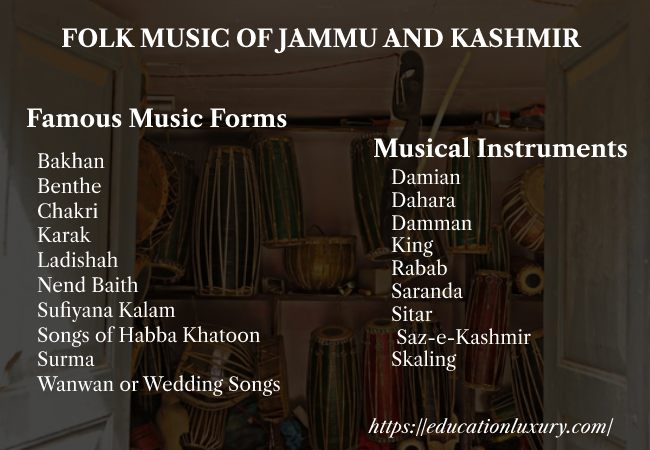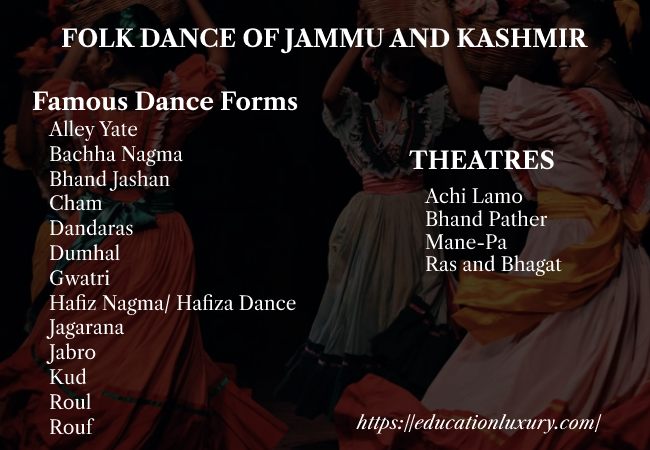Folk music of Jammu and Kashmir is rich and distinct from music played in rest of India. It is known as ‘Hindustani classical’ which is discussed in the ancient text like Neelmatapurana and Rajatarangini by Kalhana.
Kashmiri music reflects the rich musical heritage and cultural legacy of Kashmir. Kashmiri Valley music is closer to Central Asian music, using traditional Central Asian instruments and musical scales, while music from Jammu is similar to that of North India and Ladakhi music is similar to the music of Tibet. The music of the state is mainly based on classical music, love songs and present social and political conditions.
Important forms of folk music of Jammu and Kashmir are given below:
Bakhan
This song is characterised by beautiful rhythms. This folk song is sung without the use of any musical instrument. It is a widely prevalent form of mass entertainment in Kashmir region. The song has irregular and various modulations in its tone and note This variation can be identified from the hand movements of the artists. The lyric of Bakhan songs are in Dogri language.
Benthe
This folk song is sung in a chorus by a group of 5 to 7 people. This is founded by the Bakarwal and Gujjar tribal groups of the state. This song is performed during major occasions and also to celebrate social ceremony. By singing this song in chorus groups, the performers show the solidarity of the inhabitants of the valley.
Chakri
It is one of the most famous types of folk music which is very famous among Kashmiri Pandits and Kashmiri Muslims during wedding ceremony. The folk inhabitants of Kashmir perform this music form. Important musical instruments which are used in this music are harmonium rubab, garaha and Sarangi.
Karak
This is a tale ballet, sung by Jogies. It is performed along with dance. It is popular amongst the jogi commuity in Udhampur district. It is performed by three Jogies with accompaniment of musical instrument known as Rabab.
Ladishah
It is a sarcastical form of singing in the Kashmir music tradition. It reflects the present social and political conditions in a humorous manner. During harvesting period, the singers move village to village and compose songs on the spot on issues relating to a specific village. As these songs reflect the truth, thus, singers sometimes use harsh language but only for entertainment.
Nend Baith
These songs are very famous among the farmers of Kashmir. These songs are sung by farmers in groups when they start their daily schedule at the time of nend (removing weeds from newly grown plants). Farmers enjoy these songs as these make the tough days easy and increase their enthusiasm.
Sufiyana Kalam
It is a form of song that contains Sufi lyrics. The word Sufiana is related to the Sufis while the term Kalam means lyrics. The Sufiana Kalam songs are widely sung and chanted in the Kashmir valleys of India. The origin of the Sufiana Kalam form of music can be traced back to the 15th century AD. It is a form of classical music that has its own maqam or ragas or melodic modes. The instruments used in this song are santoor, wasool, sitar, tabla and harmonium. It was during this period that the people of Iran had brought with them this form of music. There are two forms of dance that are accompanied by this form of music. The Hafiza dance and the Bacha Nagma dance are usually involving this sort of music.
Song of Habba Khatoon
It is a Kashmir music which is based on the story of Habba Khatoon, a renowned princess of Kashmir. This song reflects the feelings of Habba Khatoon’s separation from her beloved, the King Yusuf.
Surma
This dance in Dogri reflects the pain of a newly married girl whose husband is away in the army. Thus, this song also shows the desire of reunion.
Wanwan or Wedding Songs
These songs are sung at weddings in Kashmir and without these songs wedding is considered incomplete. These songs are sung in chorus by two groups of women, who praise to the bride and the groom and give greetings to the family with future blessings.
Musical Instruments of Jammu and Kashmir
The state of Jammu and Kashmir has many different types of musical instruments which are used in folk music of the state. Important musical instruments are given below:
Damian
The word ‘Da’mean sound and ‘Mian’ stands for sweet thus, its meaning is ‘sweet sound’. This instrument is like a Guitar, made of 6 strings. The instrument is very famous in the nomadic people, who reside in the Changthang, Ladakh region.
Dahara
This musical instrument is like a very long rod of iron and has iron and bronze rings to support it. Ladishah songs are sung with the use of this instrument.
Damman
This instrument is made of 2 sets of kettledrums which are known as Mo and Fo meaning male and female. The instrument has a hole inside it, through which water can pour inside it and creates the deep and heavy sound. ‘Damshing’ i.e. small sticks are used to play this instrument.
King
It is the most interesting folk musical instrument of Jammu region. It has a long round wooden bar with two gourd resonators placed vertically on it. It is played especially in Karkan (ballads having religious themes) music.
Rabab
The most popular string instrument in folk music is the Rabab. It was introduced by Zain-ul-Abidin in Kashmir from Turkistan. It has a deep, hollow wooden body serving as a resonator. It is mainly used in singing Chakri and Sufiana Kalam in the Kashmir valley. It is played by plucking strings and pressing them at different scales.
Saranda
This string musical instrument looks like ‘Indian Sarangi’. Saints or Jogis of Jammu region use this instrument. It is played with a bow.
Saz-e-Kashmir
This instrument has its origin from Northern Iran. It is made of wood having 3 major gut strings.Two strings are made of silk which produce music but the third one string is of no use, as it is not touch by the bow, which is used to play this instrument.
Sitar
This Kashmiri instrument is smaller than an Indian sitar. It has seven strings fitted by the hook,which is known as ‘Mizrab’.
Skaling
This Kashmiri musical instrument is like two flutes are joined to each other. Tumbaknari ‘Nari’ in Kashmiri language is an earthen pot. This is a surahi shaped earthen musical instrument. It is mainly used by women folk at various occasions like marriages, etc. It has similar features with Irani instrument ‘Tumakh’.
Other Musical Instruments
Jammu and Kashmir also has other music instruments like Daph, Diwang (fiddle), Dingjam, Bugjal (cymbals),Gling-Liu, Sgra Snyan,Kon Kon in Ladakh, Dukkar, Swarnari in Kashmir, Chimta, Gharah, Talli,Hauns, Algoza, Tooti in Jammu.


